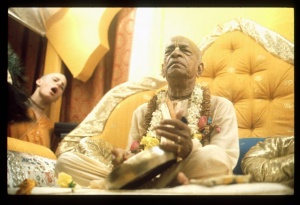SB 6.11.23: Difference between revisions
m (1 revision(s)) |
No edit summary |
||
| Line 1: | Line 1: | ||
{{info | {{info | ||
|speaker= | |speaker=Vṛtrāsura | ||
|listener=Demigod King Indra | |listener=Demigod King Indra | ||
}} | }} | ||
[[Category:Srimad-Bhagavatam - Canto 06 Chapter 11]] | |||
[[Category:Bhagavatam Verses Spoken by Vrtrasura - Vanisource|061123]] | |||
<div style="float:left">'''[[Srimad-Bhagavatam]] - [[SB 6|Sixth Canto]] - [[SB 6.11: The Transcendental Qualities of Vrtrasura|Chapter 11: The Transcendental Qualities of Vṛtrāsura]]'''</div> | |||
<div style="float:right">[[File:Go-previous.png|link=SB 6.11.22]] '''[[SB 6.11.22]] - [[SB 6.11.24]]''' [[File:Go-next.png|link=SB 6.11.24]]</div> | |||
{{RandomImage}} | |||
==== TEXT 23 ==== | ==== TEXT 23 ==== | ||
<div class="verse"> | |||
<div | :trai-vargikāyāsa-vighātam asmat- | ||
trai-vargikāyāsa-vighātam asmat- | :patir vidhatte puruṣasya śakra | ||
patir vidhatte puruṣasya śakra | :tato 'numeyo bhagavat-prasādo | ||
tato 'numeyo bhagavat-prasādo | :yo durlabho 'kiñcana-gocaro 'nyaiḥ | ||
yo durlabho 'kiñcana-gocaro 'nyaiḥ | |||
</div> | </div> | ||
| Line 17: | Line 22: | ||
==== SYNONYMS ==== | ==== SYNONYMS ==== | ||
<div class="synonyms"> | |||
<div | ''trai-vargika''—for the three objectives, namely religiosity, economic development, and satisfaction of the senses; ''āyāsa''—of endeavor; ''vighātam''—the ruin; ''asmat''—our; ''patiḥ''—Lord; ''vidhatte''—performs; ''puruṣasya''—of a devotee; ''śakra''—O Indra; ''tataḥ''—whereby; ''anumeyaḥ''—to be inferred; ''bhagavat-prasādaḥ''—the special mercy of the Supreme Personality of Godhead; ''yaḥ''—which; ''durlabhaḥ''—very difficult to obtain; ''akiñcana-gocaraḥ''—within the reach of the unalloyed devotees; ''anyaiḥ''—by others, who aspire for material happiness. | ||
trai- | |||
</div> | </div> | ||
| Line 25: | Line 29: | ||
==== TRANSLATION ==== | ==== TRANSLATION ==== | ||
<div class="translation"> | |||
<div | |||
Our Lord, the Supreme Personality of Godhead, forbids His devotees to endeavor uselessly for religion, economic development and sense gratification. O Indra, one can thus infer how kind the Lord is. Such mercy is obtainable only by unalloyed devotees, not by persons who aspire for material gains. | Our Lord, the Supreme Personality of Godhead, forbids His devotees to endeavor uselessly for religion, economic development and sense gratification. O Indra, one can thus infer how kind the Lord is. Such mercy is obtainable only by unalloyed devotees, not by persons who aspire for material gains. | ||
</div> | </div> | ||
| Line 32: | Line 35: | ||
==== PURPORT ==== | ==== PURPORT ==== | ||
<div class="purport"> | |||
There are four objectives in human life—namely, religiosity (''dharma''), economic development (''artha''), sense gratification (''kāma''), and liberation (''mokṣa'') from the bondage of material existence. People generally aspire for religiosity, economic development and sense gratification, but a devotee has no other desire than to serve the Supreme Personality of Godhead both in this life and in the next. The special mercy for the unalloyed devotee is that the Lord saves him from hard labor to achieve the results of religion, economic development and sense gratification. Of course, if one wants such benefits, the Lord certainly awards them. Indra, for example, although a devotee, was not much interested in release from material bondage; instead, he desired sense gratification and a high standard of material happiness in the heavenly planets. Vṛtrāsura, however, being an unalloyed devotee, aspired only to serve the Supreme Personality of Godhead. Therefore the Lord arranged for him to go back to Godhead after his bodily bondage was destroyed by Indra. Vṛtrāsura requested Indra to release his thunderbolt against him as soon as possible so that both he and Indra would benefit according to their proportionate advancement in devotional service. | |||
</div> | |||
<div | <div style="float:right; clear:both;">[[File:Go-previous.png|link=SB 6.11.22]] '''[[SB 6.11.22]] - [[SB 6.11.24]]''' [[File:Go-next.png|link=SB 6.11.24]]</div> | ||
__NOTOC__ | |||
</div> | __NOEDITSECTION__ | ||
__NOTOC__ | |||
Revision as of 14:29, 13 May 2021

A.C. Bhaktivedanta Swami Prabhupada
TEXT 23
- trai-vargikāyāsa-vighātam asmat-
- patir vidhatte puruṣasya śakra
- tato 'numeyo bhagavat-prasādo
- yo durlabho 'kiñcana-gocaro 'nyaiḥ
SYNONYMS
trai-vargika—for the three objectives, namely religiosity, economic development, and satisfaction of the senses; āyāsa—of endeavor; vighātam—the ruin; asmat—our; patiḥ—Lord; vidhatte—performs; puruṣasya—of a devotee; śakra—O Indra; tataḥ—whereby; anumeyaḥ—to be inferred; bhagavat-prasādaḥ—the special mercy of the Supreme Personality of Godhead; yaḥ—which; durlabhaḥ—very difficult to obtain; akiñcana-gocaraḥ—within the reach of the unalloyed devotees; anyaiḥ—by others, who aspire for material happiness.
TRANSLATION
Our Lord, the Supreme Personality of Godhead, forbids His devotees to endeavor uselessly for religion, economic development and sense gratification. O Indra, one can thus infer how kind the Lord is. Such mercy is obtainable only by unalloyed devotees, not by persons who aspire for material gains.
PURPORT
There are four objectives in human life—namely, religiosity (dharma), economic development (artha), sense gratification (kāma), and liberation (mokṣa) from the bondage of material existence. People generally aspire for religiosity, economic development and sense gratification, but a devotee has no other desire than to serve the Supreme Personality of Godhead both in this life and in the next. The special mercy for the unalloyed devotee is that the Lord saves him from hard labor to achieve the results of religion, economic development and sense gratification. Of course, if one wants such benefits, the Lord certainly awards them. Indra, for example, although a devotee, was not much interested in release from material bondage; instead, he desired sense gratification and a high standard of material happiness in the heavenly planets. Vṛtrāsura, however, being an unalloyed devotee, aspired only to serve the Supreme Personality of Godhead. Therefore the Lord arranged for him to go back to Godhead after his bodily bondage was destroyed by Indra. Vṛtrāsura requested Indra to release his thunderbolt against him as soon as possible so that both he and Indra would benefit according to their proportionate advancement in devotional service.